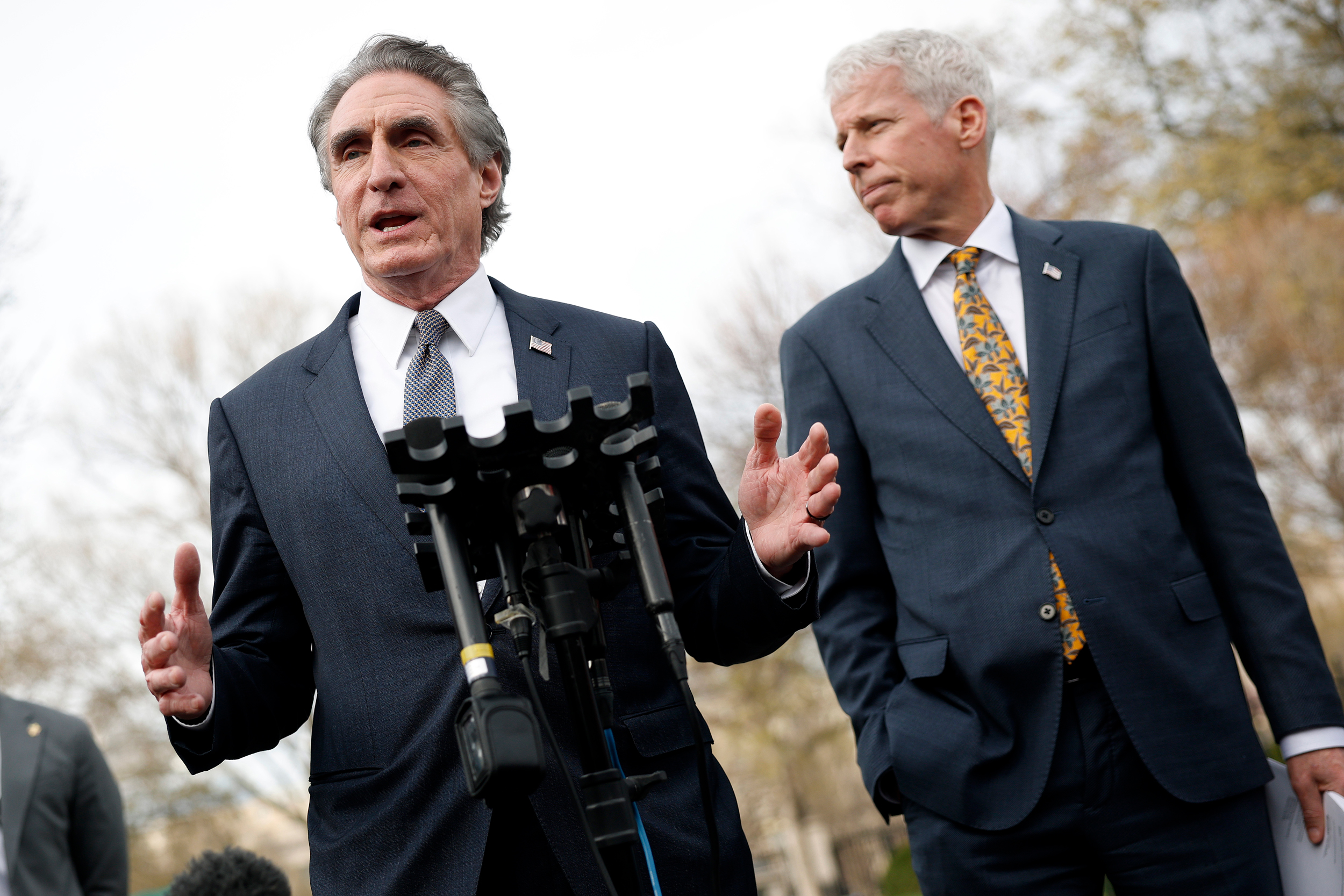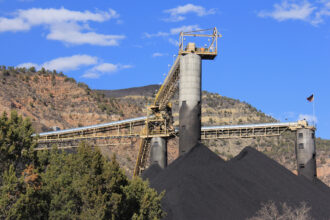The Trump administration wasted no time in tapping individuals with ties to fossil fuel industries and right-wing think tanks funded by oil tycoons for key environmental and energy policy positions, according to a new report.
Public Citizen and the Revolving Door Project, two nonprofit organizations that monitor corporate influence in government, analyzed the backgrounds of 111 nominees and appointees to executive branch positions in agencies including the Environmental Protection Agency (EPA) and the Department of the Interior (DOI) that chart environment and energy policy. They found 43 people with ties to the fossil fuel industry and 12 people tied to right-wing think tanks, many of which receive funding from oilmen, including Texan Tim Dunn.
The report found that of 37 nominees to the Department of Energy (DOE), EPA and DOI who required Senate confirmation, 25 had ties to polluting industries, including oil and gas and mining. The report covers the fossil fuel ties of Cabinet members like Energy Secretary Chris Wright and Interior Secretary Doug Burgum as well as lesser-known nominees like Audrey Robertson, a former fracking executive nominated to lead the DOE’s efficiency and renewable energy office.
“The officials running Trump’s second administration, as well as Trump himself, have been far swifter and more aggressive in enacting favors for allies in the fossil fuel and mining industries,” wrote report authors Alan Zibel of Public Citizen and Toni Aguilar Rosenthal of the Revolving Door Project. “They have also set in motion an avalanche of attacks on Trump’s perceived enemies and the industries he disfavors, including renewable energy.”
In an emailed statement, White House spokesperson Anna Kelly said that “President Trump was elected with an overwhelming mandate to ‘Drill, Baby, Drill’ and unleash America’s energy potential.”
“It’s totally logical that his energy nominees would align with the agenda the President was elected to implement and have a comprehensive understanding of the subject matter,” Kelly said.
The impact of the fossil fuel industry’s influence within the current administration, and Trump’s existing ideological bent toward promoting fossil fuel interests, has been undeniable.
The signature legislation of the president’s second term, the One Big Beautiful Bill Act, increased lease sales for oil and gas drilling and offered up millions of acres of federal land for mining, while significantly accelerating the phaseout of tax credits for wind and solar projects.
Mike Sommers, president and CEO of the American Petroleum Institute, an oil and gas trade association, told CNBC at the time that the bill “includes almost all of our priorities.”
The EPA in July also published a rule extending deadlines for the oil and gas industry to limit emissions of methane and other harmful pollutants. An industry source confirmed to Inside Climate News that the industry had requested the extension.
The administration’s plan to rescind the EPA’s “endangerment finding” for greenhouse gases would also remove the basis for the agency’s ability to regulate emissions from motor vehicles, power plants and oil and gas operations.
The oil and gas industry spent more than $70 million lobbying the federal government in the first half of 2025, according to data from the nonprofit organization OpenSecrets. That puts the industry slightly below the pace of its spending in 2024, which multiple watchdog groups described as evidence that the industry hasn’t had to lobby the government as intensely as in past years to secure key wins.
One of the most prominent examples of the Trump administration’s relationship with fossil fuel interests is Wright, the energy secretary.
Wright is the founder and former CEO of Liberty Energy, a Denver-based fracking company. Under his leadership, the DOE commissioned what top climate scientists described as an “antiscientific” report downplaying the negative impacts of greenhouse gas emissions on the climate.

He argued in a guest article for The Economist in July that climate change should be viewed “not an existential crisis but a real, physical phenomenon that is a by-product of progress.”
When asked by an Inside Climate News reporter last week how his background as a fossil fuel executive has impacted his stance on climate change and his support of the fossil fuel industry’s priorities, Wright touted natural gas as a cleaner-emission energy source than coal and suggested that the human benefits of fossil fuels outweigh the negative consequences of climate change.
“The largest driver of reduced greenhouse gas emissions in the United States, by far, roughly 60 percent, has been natural gas displacing coal in the power sector,” Wright said. “If climate change was a huge deal, it would actually [have] been awesome for my business. We would need more natural gas, more monitoring of injections underground.
“But really, I would just say, look at the data. Look at the facts. Since fossil fuels, or hydrocarbons, as I call them, came into the world, human life expectancy has more than doubled. Wealth per person around the world has grown about 16 fold,” Wright said.
“Climate change is a real thing. But from what we see as the downsides, are they remotely close to the upsides? I don’t even think they’re in the same ZIP code.”
Although natural gas produces less carbon dioxide when burned than coal, research suggests that emission reduction numbers cited by some of its proponents are inflated and don’t account for leaks of the climate super-pollutant methane during extraction and transportation.
In fact, if methane emissions from natural gas are on the high end of estimates, it may be no cleaner of an energy source than coal, said MIT professor Desirée Plata in 2023. Meanwhile, the Trump administration is seeking to increase the country’s use of coal.
The administration has also filled other key positions at the DOE with close allies from Wright’s company.
Robertson, a founder of Franklin Mountain Energy who also sat on the board of Liberty Energy, was nominated to be assistant secretary for energy efficiency and renewable energy. She is still awaiting confirmation by the full Senate.
Environmental groups criticized the nomination of a fracking executive with no apparent experience in alternative energy to run the DOE’s renewable energy office.
Franklin Mountain was purchased by Coterra Energy in 2024. Robertson agreed to sell her Liberty stock and recuse herself from activities involving Liberty, Franklin Mountain and several other energy companies she was associated with. Coterra did not respond to a request for comment.
This story is funded by readers like you.
Our nonprofit newsroom provides award-winning climate coverage free of charge and advertising. We rely on donations from readers like you to keep going. Please donate now to support our work.
Donate NowPublic Citizen and the Revolving Door Project’s report also highlights Aaron Szabo, assistant administrator for the Office of Air and Radiation at the EPA. Szabo is a former federal civil servant-turned-lobbyist whose past clients represented a range of industries but included fossil fuel interests like the American Petroleum Institute, Duke Energy and the Interstate Natural Gas Association of America.
During the first Trump administration, the report said, Szabo worked to repeal a slew of air quality rules and replace them with “weaker, industry-friendly versions.”
In an emailed response to questions confirming Szabo’s past fossil fuel clients, the EPA told Inside Climate News in August that he works with the EPA Ethics Office “to ensure all applicable ethics obligations are addressed,” and said that it is a “disservice to cherry pick clients—instead of providing a list representative of all industries—to paint an inaccurate picture.”
At the Pipeline and Hazardous Materials Safety Administration, Ben Kochman is now deputy administrator. He was previously director of pipeline safety policy at the Interstate Natural Gas Association of America, a pipeline industry group.
After the agency announced changes in June that would limit when “enhanced penalties” are applied to pipeline companies for violations, Kochman said the move came after “four years of the Biden Administration’s misguided attempts to turn PHMSA into an environmental regulator.”
“We are ensuring due process and putting safety front and center,” he said in a press release.
The agency’s mission posted on its website is “to protect people and the environment by advancing the safe transportation of energy and other hazardous materials that are essential to our daily lives.”
In a statement to Inside Climate News, Kochman said the agency protects the environment by “preventing incidents before they occur.” He said the Biden administration’s effort to expand the agency’s environmental protection role “grossly oversteps” the agency’s mandate.
“Under the Trump Administration, PHMSA is a fact based, data-driven agency entirely focused on advancing safety across the energy and hazmat sectors,” he said.
Bill Caram, executive director of the Pipeline Safety Trust, a nonprofit education and advocacy organization, said that “revolving door” appointments are “far from unprecedented.”
“It remains concerning when lobbyists move directly into oversight roles for the very sectors they recently represented,” he said. “In this case, we’ve observed policy priorities that closely align with previous, recent lobbying positions, which raises important questions about regulatory independence.”
He said that with the recent confirmation of PHMSA administrator Paul Roberti, who has significant regulatory experience, the Pipeline Safety Trust is hopeful for a “balanced approach.”
The Public Citizen and Revolving Door Project report authors also highlighted the growing influence of right-wing think tanks, including the Texas Public Policy Foundation and the America First Policy Institute. Dunn, a Texas oil billionaire, is a funder and board member of both organizations. Dunn, who reportedly netted $2.2 billion selling his company CrownQuest Operating in 2023, was also a top Trump donor.
USDA Secretary Brooke Rollins, another Texan, is a former president of both organizations.
The Revolving Door Project’s Aguilar Rosenthal drew a throughline from the increasing influence of independent oilmen like Dunn in the federal government and a return to “the tried and true offensive model of climate denialism.” The Texas Public Policy Foundation website is rife with articles disputing well-established climate science and mocking concepts like “climate anxiety.”
The organization also sued the Biden administration over the Vineyard Wind offshore wind project in Massachusetts. The case was dismissed but the organization is now petitioning the DOI and the director of the Bureau of Ocean Energy Management to reconsider the project’s permits.
“They have been trying to derail the wind industry for years now,” said Aguilar Rosenthal. “And they brought that kind of anti-wind and solar mentality to the administration.”
The Texas Public Policy Foundation declined to comment.
Inside Climate News reporter Lauren Dalban contributed to this story.
Correction: This story was updated Oct. 6, 2025, to correct a number in the secondary headline.
About This Story
Perhaps you noticed: This story, like all the news we publish, is free to read. That’s because Inside Climate News is a 501c3 nonprofit organization. We do not charge a subscription fee, lock our news behind a paywall, or clutter our website with ads. We make our news on climate and the environment freely available to you and anyone who wants it.
That’s not all. We also share our news for free with scores of other media organizations around the country. Many of them can’t afford to do environmental journalism of their own. We’ve built bureaus from coast to coast to report local stories, collaborate with local newsrooms and co-publish articles so that this vital work is shared as widely as possible.
Two of us launched ICN in 2007. Six years later we earned a Pulitzer Prize for National Reporting, and now we run the oldest and largest dedicated climate newsroom in the nation. We tell the story in all its complexity. We hold polluters accountable. We expose environmental injustice. We debunk misinformation. We scrutinize solutions and inspire action.
Donations from readers like you fund every aspect of what we do. If you don’t already, will you support our ongoing work, our reporting on the biggest crisis facing our planet, and help us reach even more readers in more places?
Please take a moment to make a tax-deductible donation. Every one of them makes a difference.
Thank you,













